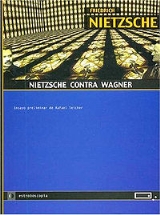
Nietzsche contra Wagner
Encyclopedia
"Nietzsche contra Wagner" is a critical essay by Friedrich Nietzsche
, composed of recycled passages from his past works, written in his last year of lucidity (1888–1889). It was not published until 1895, six years after Nietzsche's mental collapse. In it Nietzsche describes why he parted ways with his one-time idol and friend, Richard Wagner
. Nietzsche attacks Wagner's views in this short work, expressing disappointment and frustration in Wagner's life choices (such as his conversion to Christianity
, perceived as a sign of weakness). Nietzsche evaluates Wagner's philosophy on tonality
, music
and art
; he admires Wagner's power to emote and express himself, but largely disdains what Nietzsche calls his religious biases.
The work is significant for a number of reasons. It illustrates Nietzsche's evolution from a younger philosopher. It also gives the lie to those that would label Nietzsche as anti-Semitic, as is often alleged, and instead makes clear Nietzche's opposition to such ideas: "[Wagner] had condescended step by step to everything I despise — even to anti-Semitism."
Friedrich Nietzsche
Friedrich Wilhelm Nietzsche was a 19th-century German philosopher, poet, composer and classical philologist...
, composed of recycled passages from his past works, written in his last year of lucidity (1888–1889). It was not published until 1895, six years after Nietzsche's mental collapse. In it Nietzsche describes why he parted ways with his one-time idol and friend, Richard Wagner
Richard Wagner
Wilhelm Richard Wagner was a German composer, conductor, theatre director, philosopher, music theorist, poet, essayist and writer primarily known for his operas...
. Nietzsche attacks Wagner's views in this short work, expressing disappointment and frustration in Wagner's life choices (such as his conversion to Christianity
Christianity
Christianity is a monotheistic religion based on the life and teachings of Jesus as presented in canonical gospels and other New Testament writings...
, perceived as a sign of weakness). Nietzsche evaluates Wagner's philosophy on tonality
Tonality
Tonality is a system of music in which specific hierarchical pitch relationships are based on a key "center", or tonic. The term tonalité originated with Alexandre-Étienne Choron and was borrowed by François-Joseph Fétis in 1840...
, music
Music
Music is an art form whose medium is sound and silence. Its common elements are pitch , rhythm , dynamics, and the sonic qualities of timbre and texture...
and art
Art
Art is the product or process of deliberately arranging items in a way that influences and affects one or more of the senses, emotions, and intellect....
; he admires Wagner's power to emote and express himself, but largely disdains what Nietzsche calls his religious biases.
The work is significant for a number of reasons. It illustrates Nietzsche's evolution from a younger philosopher. It also gives the lie to those that would label Nietzsche as anti-Semitic, as is often alleged, and instead makes clear Nietzche's opposition to such ideas: "[Wagner] had condescended step by step to everything I despise — even to anti-Semitism."

